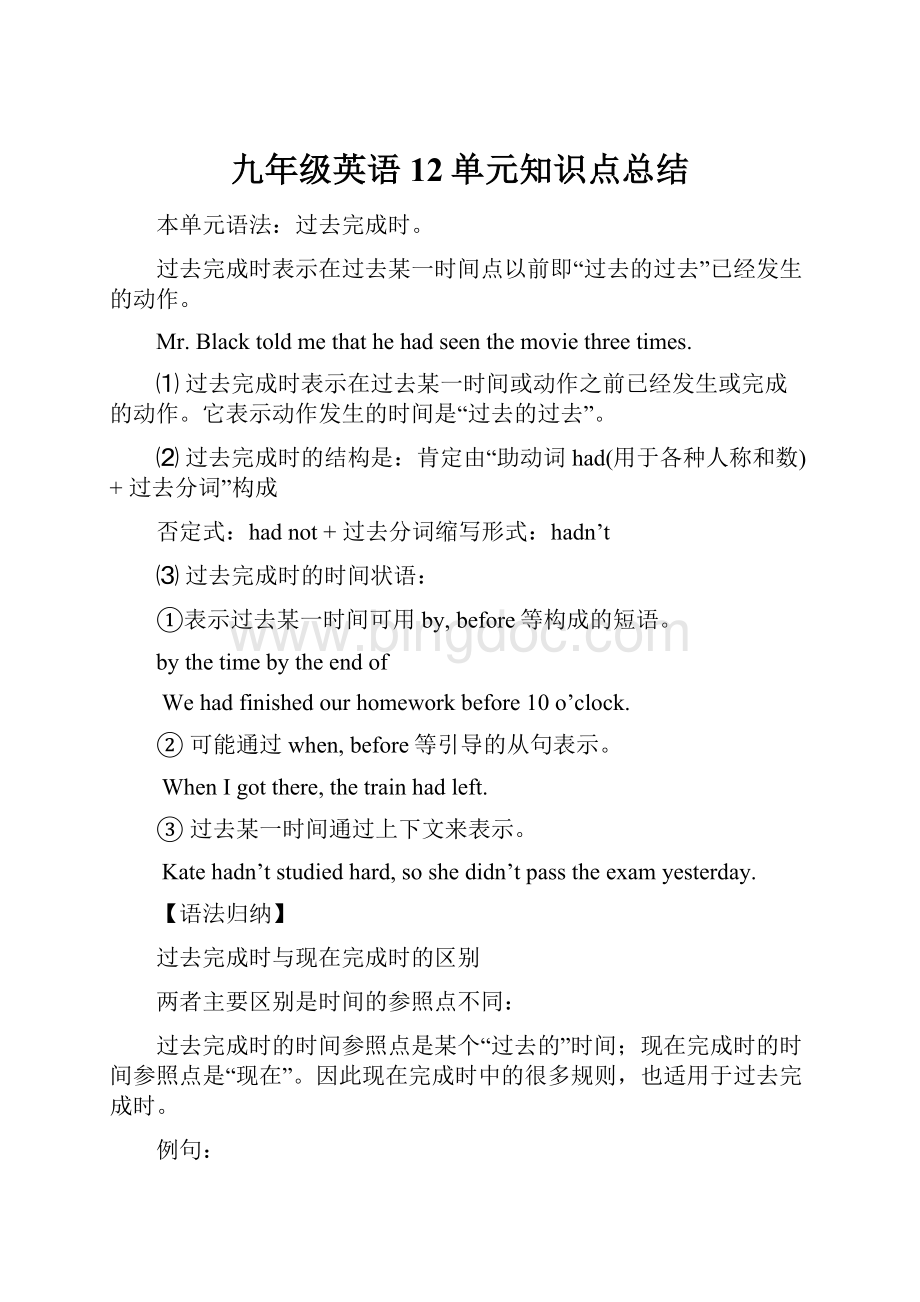九年级英语12单元知识点总结.docx
《九年级英语12单元知识点总结.docx》由会员分享,可在线阅读,更多相关《九年级英语12单元知识点总结.docx(16页珍藏版)》请在冰点文库上搜索。

九年级英语12单元知识点总结
本单元语法:
过去完成时。
过去完成时表示在过去某一时间点以前即“过去的过去”已经发生的动作。
Mr.Blacktoldmethathehadseenthemoviethreetimes.
⑴过去完成时表示在过去某一时间或动作之前已经发生或完成的动作。
它表示动作发生的时间是“过去的过去”。
⑵过去完成时的结构是:
肯定由“助动词had(用于各种人称和数)+过去分词”构成
否定式:
hadnot+过去分词缩写形式:
hadn’t
⑶过去完成时的时间状语:
①表示过去某一时间可用by,before等构成的短语。
bythetimebytheendof
Wehadfinishedourhomeworkbefore10o’clock.
②可能通过when,before等引导的从句表示。
WhenIgotthere,thetrainhadleft.
③过去某一时间通过上下文来表示。
Katehadn’tstudiedhard,soshedidn’tpasstheexamyesterday.
【语法归纳】
过去完成时与现在完成时的区别
两者主要区别是时间的参照点不同:
过去完成时的时间参照点是某个“过去的”时间;现在完成时的时间参照点是“现在”。
因此现在完成时中的很多规则,也适用于过去完成时。
例句:
WhenIgottothecinema,thefilmhadbeenonforfiveminutes.当我到达电影院时,电影已演了五分钟了。
(got是一个过去的“时间点”,电影“开始”在我“到达”之前,是“过去的过去”。
因为forfiveminutes为延续一段的时间状语,应用可延续的系表结构beon的过去完成时形式。
)
注:
过去完成时是一个相对的时态,表示的是“过去的过去”,只有在和过去某时或某动作相比较时才用到它,因此当原句中若找不到一个“过去的时间”作为参照点时,是不能用过去完成时的。
例句:
Hegottotherailwaystationandsuddenlyrealizedthathehadforgottentobringhisticket.他到了火车站后忽然意识到他竟忘记带车票了。
(“忘记”这一动作在“意识到”这一动作之前。
)
1.bythetime+时间状语从句
(1)时间状语从句的时态是一般现在时时(表示将来),主句用将来完成时;
(2)时间状语从句是一般过去式时,主句用过去完成时。
bytheendof+时间点
(1)+过去的时间点,主句用过去完成时;
(2)+将来的时间点,主句用将来完成时;
by+时间点
(1)+现在的时间点,主句用现在完成时;
(2)+过去的时间点,主句用过去完成时;
(3)+将来的时间点,主句用将来完成时。
Bythetimeyoucameback,Ihadfinishedthisbook.
BythetimeJanegetshome,herauntwillhaveleftforBeijing.
Bytheendoflastyear,IhadstayedinXinzhengforsevenyears.
Bynow,Ihavefinishedallmyhomework.
2.leave与forget的用法:
(1)leave“遗留,落下,忘记带”,侧重指把某物或某人留在某个地方,后常跟地点状语;
(2)forget“忘记”,侧重指忘记某件事情,后常跟todo(忘了要去做)或doing(忘了做过)。
remembertodorememberdoing
♦leave→left→leftv离开
(1)leavesth+地点把某物遗忘在某地
(2)leavefor+地点(目的地)离开去某地
(3)leaveamessage留言askforleave请假leaveschool(中学)毕业
(4)leaveonebyoneself=leavesb.alone把某人单独留下
3.when的特殊用法“这时,突然”,用于四种结构
1)bedoingsth...when
IwasthinkingofthiswhenIheardmynamecalled.
2)beonthepointofdoingsth...when
Shewasonthepointofgoingoutwhenthetelephonerang
3)beabouttodosth...whenWewereabouttostartwhenitbegantorain.
4).sb.hadhardly/scarcely/barelydonesth...when
Wehadhardlyfallenasleepwhenthebellrang.
另:
beaboutto忙于;即将做某事。
侧重于表示动作马上就要发生,常与when引导的从句连用,但不与具体的时间状语连用。
4.befullof=befilledwith充满,装满fill…with..
Thebasketisfullofapples.=Thebasketisfilledwithapples.
5.get/go/come/bebacktoschool=returntoschool意为“回到学校”
1)getbackto后接表地点的名词,意为“回到某地”;
2)getbackto后面接人,可引申为“回复某人的信件,电子邮件,电话”等;
3)getback还可表示“回来,返回,拿回,取回”等含义。
4)giveback=return归还
6.Myalarmclockdidn’tgooff!
gooff发出响声,(闹钟)闹响Thealarmwentoffjustnow.
goover复习goaway离开goby(时间)过去goforawalk出去散步goon继续go+doing去做某事
gofishing/shopping/skating/swimming去钓鱼/去买东西/去溜冰/去游泳
7.waitinlinewith意为“与……排队等候”standinline站成一排cutinline插队
8.evenif/eventhough/though/although都可以引导让步状语从句。
Evenif=eventhough“即使、纵然”引出的从句叙述的是假设或把握很大的事情
though“虽然”,引出的从句叙述的是事实。
IwilltryevenifImayfail.
Thoughitwasverylate,hewentonworking.
[注]though和but不能同时出现在句中。
9.alive,living,live与lively
lively
1)live “活着的”,通常指物,不指人,常用来作定语放名词的前面。
还指“实况转播的”。
例如:
a live fish 一条活鱼。
Do you like a live show or a recorded show ?
2)living意为“活着”强调说明“尚在人间”,“健在”,可用来指人或物,作定语或表语。
例如:
.My first teacher is still living .English is a living language .
A living language should be learned through listening and speaking .
He is regarded as one of the best living writers at present .
注意:
living 前加上 the , 表示类别,指“活着的人们”。
例如:
The living must finish the work of those dead .
living 还可用于短语,例如:
make a living bydoing谋生。
3)alive 意为“活着”,侧重说明生与死之间的界限(本来会死但没有死),既可指人,也可指物;可用来作表语,后置定语或宾补。
例如:
He is dead , but his dog is still alive .
He wanted to keep the fish alive.
Thisisafishalive.
4)lively 则意为“活泼的”,“活跃”,“充满生气的”,可作定语、表语或宾补,既可指人,又可指物。
例如:
Jenny is a lively girl . Everything is lively here . 这儿一切都生机勃勃。
He had a strange way of making his classes lively and interesting .
live物定语现场的
living人/物定语、表语Makealiving/theliving
alive人/物后置定语、表语、宾补生与死的界限
lively人/物定语、表语、宾补生气勃勃的,无活着的意思。
10.TheotherplaneswerefullsoIhadtowaittillthenextday.
till意为“到,直到”,相当于until.
⑴用于肯定句时,主句的动词只用延续性的,它所表示的动作一直延续到till或until表示的时间为止,意为“直到……为止”。
ShewatchedTVtillhermothercameback
⑵用于否定句时,主句的动词一般是非延续性的,也可以是延续性的,它所表示的动作直到till或until所表示的时间才发生,意为“直到…(才)”。
Shedidn’twatchTVtillhermothercameback.
11.showup出席onshow=ondisplay展览showoff炫耀showsb.around带某人参观showsb.sth=showsthtosb向某人展示某物
12.playtricksonsb.捉弄某人playjokesonsb.对某人开玩笑laughat嘲笑makefunof取笑
13.Manypeoplerantotheirlocalsupermarketstobuyasmuchspaghettiastheycould.
as+adj./adv.+assb.can/could=as+adj./adv.+aspossible.尽可能的
Wemustdoeverythingaspossible.=Wemustdoeverythingaswellaswecan.
14.sellout卖光(用物作主语时,常用于被动语态besoldout)
giveout分发=handout分发workout解答出(人)runoutof用完(物)runout用完goout出去findout查明lookout=becareful=takecare当心takeout拿出putout熄灭cutout删除
15.findout,lookfor与find
(1)findout强调经过调查、询问、研究等曲折过程后才能找出。
如:
Pleasefindoutwhenthetrainleaves.
(2)lookfor意为“寻找”,强调寻找的过程。
(3)find意为“发现,找到”,强调寻找的结果。
16.endupdoingsth.(以…)结束;
Imustmakegooduseofmysparetime,orIwillendupdoingnothing.
endupas最终成为
Hestartedasanemployeeandendedupasheadofthefirm.
endupsth.表示“结束某事”
Thescientistendeduphisspeechatlast.
endupwithsth.(以……)结束
ThestudentsbeganwithspeakingEnglish,butendedupwithspeakingChinese.
attheendof在…末尾intheend=atlast=finally最后
17.marryv嫁娶
(1)AmarryB.“A与B结婚”BillmarriedMaryonJanuary1,1994.
(2)AandBgetmarried=AandBaremarriedA和B结婚
getmarried结婚KateandTomgetmarriedlastyear.
(3)marryAtoB“把A嫁给B”Shemarriedherdaughtertoarichman.
(4)be/getmarriedtosb与……结婚
18.hear短语
hear可用作及物动词,表示“听到”、“听见”,侧重于听的结果。
如:
I'mverysorrytohearthat.
hear后面还可以跟that从句,Ihearthatyou'vebeenhereforseveralyears.
(2)hearof/about是指间接地“听到”“听说”后接名词性质的词。
如:
Ihaveneverheardofhimbefore.我以前从来没有听说过他。
hearof与hearabout的意义相近它们含有“听人说起”,“从书报上看到关于”等意义
I’veneverheardofhim.我从来没有听说过他。
Haveyouheardabouthimfromanywhere?
你从什么地方听到过他吗?
(3)hearfromsb.=get/receivealetterfromsb.指“收到……的来信”其宾语应是人,而不是信。
如:
Ioftenhearfrommyparents.我经常收到父母的来信。
19.get/bedressed穿衣服
wear穿,戴(强调状态)宾语可以是衣帽,也可以是饰物、奖章等。
You’dbetterwearblueorblackpantswithblownshoes.
puton穿,戴(强调动作)后接衣服、鞋帽等。
Iwantyoutoputonthiscoatandthishat.
dress给……穿衣服宾语通常是人,意思是“给……穿衣服”。
dressoneself或getdressed表示给自己穿衣服。
It’stimetowakeupandgetdressed!
in后接表示衣服或颜色的词,着重于服装的款式或颜色。
它所构成的短语只能作表语或定语。
Hewasinanewblackcoat.Thegirlinredismysister.
20.keep用法1.keep+形容词
2.keep+sth/sb+形容词
3.keep+doing一直做某事
4.keep/stop/preventsb....fromdoing...阻止做某事。
。
。
5.keepapet饲养一个宠物
6.HowlongmayIkeepthisbook?
keep指借。
二、单词拼写(单句首字母填空)(共20小题;共20分)
21.Io thismorning,becausemyalarmclockdidn'tgooff.
22.Luckily,thepeopletrappedintheb buildingwerehelpedout.
23.Hewasn'tdeadafterthetrafficaccident(交通事故)andstilla now.
24.Mr.Wanga thatwewe'llhaveapicnictomorrow.
25.Whataf Iwastobelieveheisagoodman!
26.Thebeautifulsceneofthatmountainvillagewillprobablyd foreverbecauseofpollution.
27.Herd aboutthewildanimalswillchangepeople'straditionalideaabouttheirbehaviors.
28.Afterthebellr ,allthestudentsrushedoutoftheirclassrooms.
29.Thedoctorskeptonsavingtheoldmant hewokeup.
30.Perhapshe'lldresshimselfupasaclowninthec party.
31.Ihavenevero ,butyesterdaymyalarmclockdidn'tgooff.
32.Thechildb hisfingerswhileplayingwithamatchyesterday.
33.Hewasstilla afterheexperiencedtheterribleearthquake.
34.Mr.Wanga thatwewouldhaveapicnictomorrow.
35.It'sreportedthatlotsofpeopleweref bythehoax.
36.Ididn'ttakephotosoftheUFO,becausetheUFOhadd beforeItookoutthecamera.
37.Manynewd weremadewiththehelpofacompass.
38.Sheoftenwearsapairofearr .
39.Weplayedfrombreakfastt lunch.
40.Afriendonceinvitedmetoac party.
三、单词拼写(根据中文提示拼写单词)(共20小题;共20分)
41.Assheisill,wehaveto (取消)ourtriptotheWestLake.
42.Let'shopeourdifficultieswillsoon (消失).
43.Shemadesomanymistakeswhenshegaveaspeechthatshefeltvery (尴尬的).
44.Itisanew (发现)inscience.
45.Theoldladykeptthelittledog (活着)byfeedingitwarmmilk.
46.Tommissedtheearlybusbecausehe (睡过头).
47.ThepresidentofAmerica (宣布)thatthewarinIraqhadstopped.
48.Sheisthepublicinformation (官员).
49.I (取消)myappointmentwithadentistyesterday.
50.Whenspringcomes,iceandsnowwill (消失).
51.Hecouldn'tanswertheteacher'squestion.Hefelt (尴尬的).
52.Manynew (发现)weremadewiththehelpofcompass.
53.Wemustworkhardwhenweare (活着的).
54.I (睡过头)thismorningsothatIwaslateforschool.
55.They (宣布)thattheyhadfoundthemurdererlastweek.
56.Whatdidthe (官员)saytoyourfather?
57.I'mafraidwehaveto (取消)themeeting.
58.Whenspringcomes,thesnowandice (消失).
59.Whentheylookedathiminsurprise,hefeltvery (尴尬的).
60.Thereisno (发现)intheresearchforthecauseoftheearthquake.
完形填空
Tenyearsago,26-year-oldCivalMillswasjustdaysawayfromfinishinghishospitalinternship(实习期)inSouthAfrica.Hewaslookingforwardtoabrightfuturein71 .Butlater,hemetacar72 .Whenhefinallywokeup,hediscoveredthathewasunabletomovea73 .
Hehadlocked-insyndrome(闭锁综合征)—heiscompletelyconscious(神志清醒的),yetunabletomoveanymuscleexcepthis74 ."AllIcouldhearwasthesoundofthedifferentmachineskeepingme7